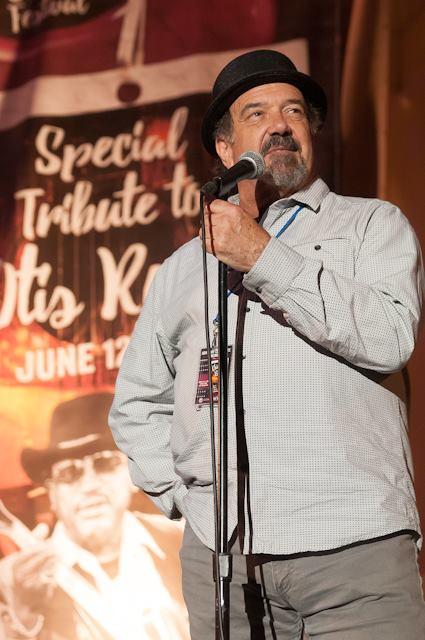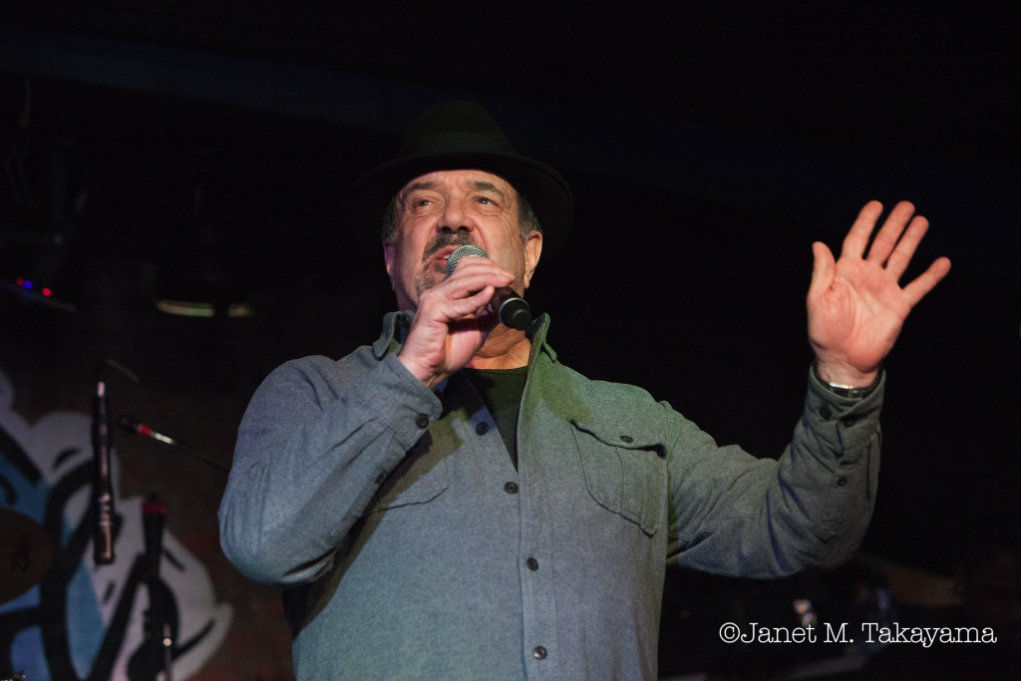Tom Marker‘s Blues credentials have been well established in Chicago throughout his 35-year career hosting the popular “Blues Breakers” program on WXRT. Marker has been a presence on the air in Chicago since the mid-70s on stations including WJKL-FM (“The Fox”) and WLUP-FM (“The Loop”) as well as WXRT. Marker is also well known to Chicago Blues fans as the primary emcee at the Chicago Blues Festival.

With “Blues Time with Tom Marker” on WDCB, Marker and his fans delve into the best of the Blues – past, present and future – deeper than ever before. Each week’s show, airing from 7pm to 9pm, kicks off WDCB’s 10 hour all night Saturday Blues extravaganza, running until Sunday morning at 5am.
In 1999, Marker was presented with “Keeping the Blues Alive” award by The Blues Foundation in Memphis Tennessee.
Brant Buckley:
What does Chicago Blues mean to you?
Tom Marker:
It doesn’t mean quite as much as my wife, kids and granddaughters, but music means a lot to me and the Blues is my favorite music. I’ve been involved in the Blues for so long that it is a big part of my identity, both public and private. I love the Blues scene in Chicago where so many of my friends are working artists, club owners, employees, record label people, producers, and agents. It really is a great community.
Can you talk about the preparation that goes into your Blues shows?
I almost always start by putting down the names of artists who have new releases that I think should be played that week, artists who have engagements in Chicago in the coming week that should be mentioned, and artists with birthdays coming up. I then plug in the songs and albums, write some notes, and fill in the rest of the time with songs and artists that haven’t been played in a while or songs that come to my mind.
I would like to think that my radio programs are completely unique as far as Blues radio programs go. It’s unlike any other Blues program in any other city. The shows that I do are really for the Chicago Blues community: the fans, the performers and the scene in general. While the programs are first and foremost for entertainment, I’m always aware of my responsibility to support the scene with my programs. I like to think that I help the artists become better known. I want the audience to know when an artist, especially a local artist, has a new album or a special appearance. I want to encourage listeners to support the Blues by allowing them to know who is doing what and where by sharing my enthusiasm for many local events. I want my programs to reflect what’s happening here in Chicago right now.
I have an intro that I use for my WDCB program where I explain the basic theory of what I am doing. I tell the audience I play Blues from near and far, but mostly from right here. I play Blues that is old and new but a lot from right now. When I first started doing Blues radio shows, I was inspired by “Living Blues” Magazine and the “Living Chicago Blues” series of albums that came out on Alligator Records in 1978. Those two things helped me to see the Blues not as historical music but music of the present. It’s not music from some other place but music from Chicago. Back in the early days, field workers were singing songs that related to their conditions and the Blues has carried that tradition forward to the present. There is plenty of social commentary in Blues today that doesn’t take the view of the landowners and bosses. The Blues is about present life and that’s reflected in my programs. The Blues I play is something you can use right now. You can go out and see it, purchase recordings, and listen to it as it will relate to your life right now. Chicago Blues is a current living thing that’s different from any other place in the world. A Blues program from Chicago is by definition a different animal; closely connected to its place and time.
How has radio changed since you started?
I started a long time ago and there have been a lot of changes. I first started in the Chicago market in 1975. First, a lot of people think that radio leads people’s tastes, that songs are popular because they are on the radio. From my vantage point, it is really just the opposite, especially in the present. The commercial radio stations these days mostly follow the listener’s tastes. They play what they already know the listeners will like. It’s different than the past. For example, when I went into radio in the seventies there was this huge expansion of radio channels in America because of the new popularity and availability of FM radio. There were suddenly three to four times as many radio stations in each city that people were listening to. Some of these stations really helped widen the scope of what listeners could expect from radio. Listeners at some of these stations were really open to hearing new things; listening to something the DJ had just discovered and wanted to share. Young people were given a chance to program stations for their peers and radio stations. In some cases the stations were being run by people who were involved not because they were radio people but because they were music people. That was when stations like WXRT first appeared. In the early days of my work at WJKL in Elgin, and WXRT, we would sometimes play Ella FitzGerald, the Marshall Tucker Band, and the Ramones in the same hour. The Blues fit right in. Some of what we were playing in those days is now referred to as Classic Rock. A lot of it didn’t sound much different than the Blues. Bands like the Rolling Stones, The Allman Brothers Band, and Led Zeppelin were just a small step from the Blues. Plus, WXRT always had a strong sense of place so being in Chicago made sense to play Blues.
Radio listeners have changed over the years compared to forty years ago and that’s part of why radio has changed. People listening to the radio now are the grandchildren of listeners in the seventies. They have different tastes and they want different things. The kind of music they listen to is different and it’s not nearly as closely related to Blues. Commercial radio stations in this century are generally owned by large broadcast companies. The stations that used to be programmed by radio people and music people are generally operated by business grads and the music is picked by researchers. Listener supported public radio stations are programmed entirely differently. It’s very interesting for me to have a foot in both worlds. Whether commercial or listener supported, radio is not as big a part of youth culture that it was when my career was beginning or the teenage culture of the late fifties and sixties.
Do you think there’s hope for a Blues crossover song to make the Billboard Hot 100?
I can’t say no because anything can happen. Every once in a while there is someone that just breaks out and is really popular. Blues is not what the popular music stations are currently looking for, but it could happen. I can’t really predict that it will, but I wouldn’t give up hope. The radio stations are really following the people’s choices. If somebody was really popular it could happen.
Do you have a favorite Chicago Blues club?
No. If I decide to go out and see live Blues in Chicago I usually choose a show based on who is performing. Certain artists are at career points where they have a good draw and are guaranteed to play larger rooms. I love to see Blues at S.P.A.C.E. in Evanston and City Winery in the West Loop. Buddy Guy’s Legends is of the size that they can draw some of the larger acts and they are a real Blues club. Rosa’s Lounge is a favorite of mine and I believe in their slogan: Chicago’s Friendliest Blues Lounge. B.L.U.E.S. on Halsted is tiny and wonderful. Kingston Mines, also on N. Halsted, draws a younger crowd that likes to dance and they are open super late. The Odyssey East on S. Torrance at 99th St. is friendly and inviting and presents some good Blues. I love the tiny Taylor Street Tap with its very friendly neighborhood vibe and small bands in a very intimate setting. There are a number of other venues that sometimes book Blues and my favorite of these is FitzGerald’s Nightclub on Roosevelt Road in Berwyn. That’s where we present our WDCB Bluesday Tuesday shows with live broadcasts on the first Tuesday of each month. Being a weeknight we are able to offer “weekend” level bands a low cover charge and people love that the bands begin so early, 7pm.
How long have you been an emcee at The Chicago Blues Festival?
I began to M.C. acts at Blues Fest in the eighties. WXRT has been a long time sponsor of the fest so at the beginning I was “assigned” to intro some bands. I think it was decided at some point by the fest producers that it would be easiest to just have me M.C. all of the evenings and I was good with that. Over the years, I have become more involved with the fest and I continue to be the M.C. for the Pritzker Pavilion stage each night. I’m commonly seen as M.C. for the “Buddy Shows” at Buddy Guy’s Legends every January. I think I had so much fun doing that that it made other people want to do it too. So the fun is now shared, but I still intro Buddy for at least a couple of those shows. I’m also called on to M.C. other festivals, benefits, and shows around town.
What else do you want to accomplish?
My career is starting to wind down. I am looking to work less in the future, not more. I am really happy with the way things are going now. I would like to point out that I worked full time for 33 1/3 years at WXRT. Now at WXRT, I only do what I like best, my Sunday night Blues Breakers show. I love being the host of “Blues Time with Tom Marker” every Saturday evening on WDCB. They are very supportive of the Blues there. The hosting and producing of the monthly WDCB Bluesday Tuesday shows and broadcast is also a great gig and is a lot of fun. That’s three jobs. Plus, there are various other shows and committees I find myself involved in so that’s enough.
Tom Marker on WXRT
Blues Time on WDCB
*Feature image Janet Mami Takayama


